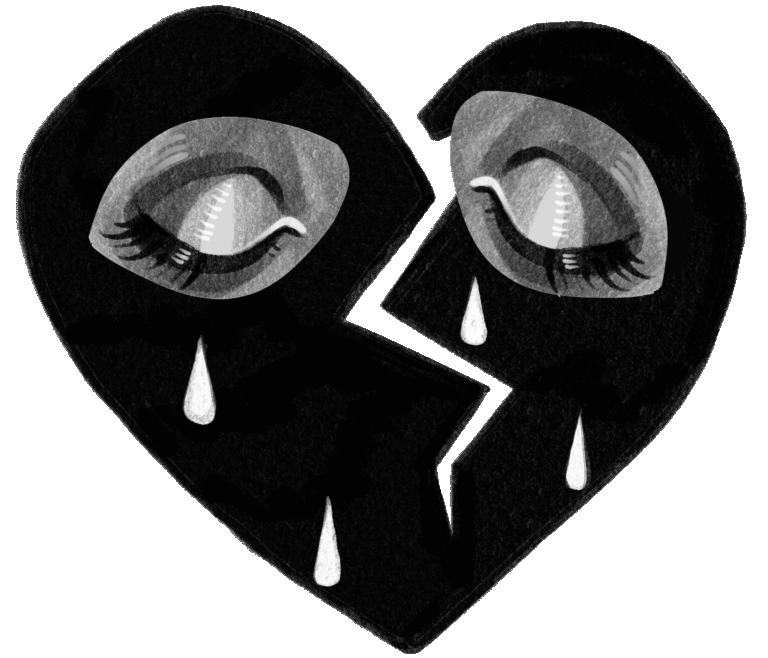
It wasn’t even a real relationship. I sat there baffled by how gutted I felt, trying to talk myself out of tears and into nonchalance. But the conflict of emotions I was feeling mirrored exactly what situationships are – the gray area, the ambiguity, the fantasy. Trying to be chill and unattached, while also daydreaming about the potential of what it might grow to. The situationship that shattered me the most was a guy that there was no possible endgame with. We lived in different cities, but when we were together, we were in our own little bubble. We texted all day every day. The distance made things exciting, and there was no pressure. But when it ended, I felt like I lost my favorite secret hobby that was just for me.
You weren’t official, no title ever defined it and half your group chat didn’t even know the person’s name. Yet somehow, when the situationship collapsed, it wrecked you in a way that felt borderline embarrassing. Here’s the thing: heartbreak doesn’t ask for a label.
I tapped relationship experts on why oftentimes situationships hurt more than the end of committed relationships and how to navigate the fall out.
- You Weren’t Being Completely Honest with Yourself
A New York-based family and marriage therapist, Tory Eletto says that it’s important to be mindful if your emotional connection starts to surpass the safety, trust and trajectory of the relationship.
“I think people should be very honest about what they want and what they can handle,” says Eletto. “Being in one when we are genuinely choosing it is different than when we are settling for it.”
- The Anxiety of Not Knowing
In situationships you’re flying by the seat of your pants. While you may go out to dinner, hit a concert, hook up, most of the time the ‘no strings attached’ aspect leaves a hypervigilance because you never know when it is going to end. Philadelphia-based therapist, Deepal Pandya, MA, who helps couples and individuals work through trauma and intimacy issues, says that sometimes choosing to be in a situationship can limit your vulnerability in the dynamic. Although this may not be an issue for some people since they know the person they are spending time with is not a long-term partner, for others the end is more difficult to accept.
“When the situationship ends, they may be faced with feelings of loneliness and increased anxiety,” Pandya says.
- Confusion in the Gray Area
There’s so much gray area in situationships. The go-with-the-flow vibes don’t negate the fact that the more you spend time with them the more your feelings grow for them. Situationships essentially live in a vacuum; when you’re together you act as though you’re in a relationship, and then press pause when you’re not together and continue to live your life until the next time you’re together. Lindsey Metselaar explains on her podcast We Met At Acme that it’s important not to give “partner treatment” to someone who isn’t, in fact, your partner. It blurs the lines and sends mixed signals to not only the other person but to yourself and your expectations of the situationship.
- Romanticizing the Fantasy
We all have rom-com delusions. We grew up watching movies that touted grand gestures, exceptions to the rules and love stories against all odds. Eletto explains that this is often one of the ways we get trapped in situationships when we really don’t want them.
“We lose touch with our needs, boundaries and sometimes our worth chasing the fantasy of what we want,” Eletto says. But in reality, your fantasy is giving you a sense of what you want, and you should own that. “Instead of projecting it onto another and losing yourself, own it and let it guide how you show up.”
Pandya adds that romanticizing is a type of fantasy.
“It is a self-soothing skill that could have developed in childhood,” says Pandya. “In addition, our culture reinforces these fantasies and inappropriate relational behaviors through various forms of media.”
- There isn’t Much Room to Get Closure
As someone who has felt the pain when a situationship ends, I know it sucks. Another reason it’s so hard is because there’s this made-up notion that because it was a “situationship,” it shouldn’t have that deep an impact, and you should be able to bounce back and move on. Which doesn’t leave a lot of room for closure or feeling like it’s appropriate to have a conversation with that person, without looking needy and unhinged. To get through it it’s important to talk to your support system.
“Allow yourself to grieve, learn from the experience and what actually works or doesn’t work for you,” Eletto adds. “If it’s bringing up any old wounds or struggles with self-worth, it’s also giving you an opportunity to heal.”
Pandya seconds the sentiment, that processing your emotions is an important step in moving through them.
“Having your heart broken is truly debilitating, and it can take time to process the pain and loss,” Pandya says. Talk therapy is an option, but there are many ways to heal and reconnect with yourself. “It can be helpful to spend time in nature, engage in physical activities, be around loved ones who make you feel valued and cared for, or do something nurturing and restorative.”
Well done.